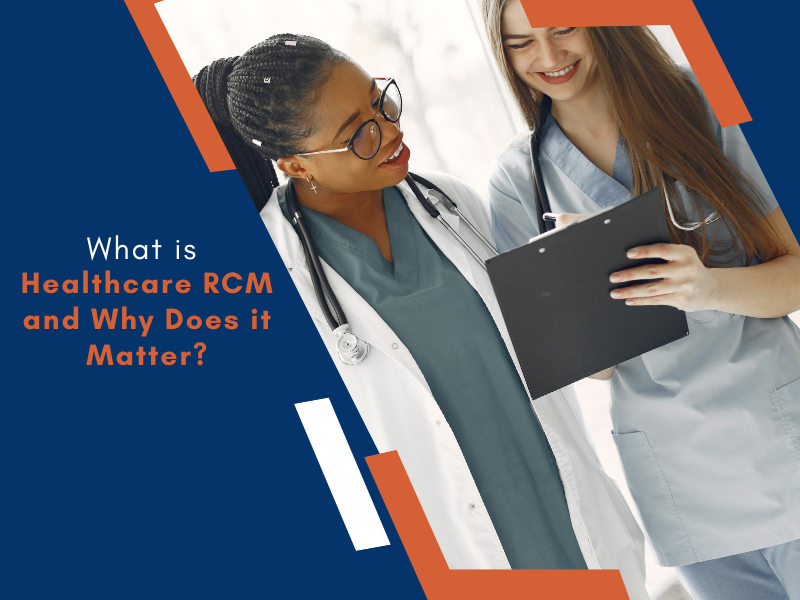Healthcare Revenue Cycle Management (RCM) plays a vital role in medical billing and healthcare operations, ensuring smooth financial processes for providers while improving patient care experiences. RCM involves managing the financial lifecycle of patient services, from appointment scheduling and claims submission to payment collection and revenue analysis.
In today’s healthcare landscape, efficient RCM is not just a financial necessity but a cornerstone for maintaining operational excellence and enhancing patient satisfaction. This blog delves into the concept of healthcare RCM in medical billing and highlights why it matters in the ever-evolving healthcare industry.
Understanding Healthcare RCM in Medical Billing
Healthcare RCM is the backbone of medical billing systems, acting as the bridge between clinical services and financial management. It starts the moment a patient schedules an appointment and continues until all payments have been settled, either by the patient or their insurance provider.
Key components of healthcare RCM in medical billing include:
- Patient Registration and Verification: Ensuring patient data, including insurance details, is accurate to avoid claim denials.
- Charge Capture: Recording the services provided during patient visits.
- Claims Submission: Preparing and submitting claims to insurance companies in compliance with regulatory standards.
- Payment Posting: Applying payments received from insurance providers and patients.
- Denial Management: Addressing rejected or denied claims promptly to recover due payments.
- Reporting and Analytics: Monitoring performance metrics to identify inefficiencies and enhance financial outcomes.
Efficient RCM ensures that healthcare providers maintain a healthy revenue flow while reducing administrative burdens.
Why Does Healthcare RCM Matter?
Effective revenue cycle management is critical for healthcare providers to achieve financial stability and deliver quality patient care. Here’s why healthcare RCM in medical billing is so significant:
1. Minimizes Revenue Losses
Errors in medical billing and claim submissions can lead to revenue losses due to denials or delays in payments. A robust RCM process minimizes such errors, ensuring that claims are accurate and compliant with payer requirements.
2. Enhances Operational Efficiency
Healthcare RCM streamlines administrative tasks, allowing healthcare providers to focus on patient care rather than navigating complex billing processes. This operational efficiency improves the overall functioning of healthcare facilities.
3. Improves Patient Satisfaction
Transparent billing processes and efficient payment collections contribute to a better patient experience. When patients understand their financial responsibilities clearly, it fosters trust and reduces confusion.
4. Ensures Compliance with Regulations
The healthcare industry is heavily regulated, and non-compliance can result in hefty fines or operational disruptions. Healthcare RCM ensures adherence to the latest regulations, safeguarding providers from legal and financial risks.
5. Boosts Financial Stability
With effective RCM, healthcare providers can maintain steady cash flows, reducing dependency on external financing. This financial stability enables them to invest in better equipment, staff training, and improved patient care services.
Challenges in Healthcare RCM
While the benefits of healthcare RCM in medical billing are evident, implementing an efficient system is not without challenges. Providers often face obstacles such as:
- Complex Insurance Policies
Understanding and managing the intricacies of various insurance plans can be daunting, leading to claim delays or rejections. - Frequent Regulatory Changes
Keeping up with evolving healthcare regulations requires continuous updates to RCM processes. - High Denial Rates
Without proper denial management strategies, healthcare providers risk losing significant revenue due to unresolved claims. - Patient Payment Collections
With the rise of high-deductible health plans, collecting payments directly from patients has become a challenge for providers. - Lack of Advanced Technology
Many providers still rely on outdated systems, limiting their ability to streamline RCM processes effectively.
Best Practices for Effective Healthcare RCM
To overcome these challenges and optimize healthcare RCM in medical billing, providers can adopt the following best practices:
1. Invest in Technology
Implementing advanced RCM software can automate billing processes, track claims, and generate insightful reports, reducing manual errors.
2. Regular Staff Training
Training staff on the latest billing codes, insurance policies, and RCM software ensures accuracy and compliance.
3. Proactive Denial Management
Identify common reasons for claim denials and implement proactive measures to prevent them.
4. Patient Education
Educate patients about their financial responsibilities, insurance coverage, and payment options to improve collections.
5. Outsource RCM Services
Partnering with professional RCM service providers allows healthcare organizations to focus on patient care while experts handle the complexities of billing and revenue management.
The Role of Technology in Healthcare RCM
Technology is revolutionizing healthcare RCM in medical billing by introducing automation, analytics, and artificial intelligence (AI) into the process. Here’s how technology enhances RCM:
- Automation: Automates routine tasks like claim submissions, eligibility verification, and payment posting.
- Data Analytics: Provides insights into revenue trends, helping providers identify areas for improvement.
- AI and Machine Learning: Predicts claim outcomes, optimizes workflows, and enhances decision-making.
- Cloud-Based Solutions: Ensures secure data storage and accessibility, improving collaboration among stakeholders.
By leveraging these technologies, healthcare providers can achieve greater accuracy, efficiency, and financial stability.
Future Trends in Healthcare RCM
As the healthcare industry continues to evolve, RCM processes must adapt to new trends and challenges. Some emerging trends include:
- Patient-Centric Billing Models: Prioritizing transparency and convenience in billing processes.
- Value-Based Care: Aligning RCM with value-based reimbursement models to improve patient outcomes.
- Integration with EHR Systems: Enhancing data sharing and coordination between clinical and financial systems.
- Focus on Cybersecurity: Ensuring data security in an era of increasing cyber threats.
By staying ahead of these trends, healthcare providers can maintain a competitive edge while delivering exceptional patient care.
Partner with Apaana Healthcare for Efficient RCM
Efficient revenue cycle management is essential for healthcare providers to thrive in today’s dynamic environment. If you’re looking for a reliable partner to streamline your RCM processes, Apaana Healthcare is here to help.
At Apaana Healthcare, we drive operational excellence with global healthcare management solutions. Our expertise in outsourced services for health plans includes:
- Member enrollment
- Claims administration
- Medical billing & coding
- Provider engagement
Our cost-effective solutions empower healthcare providers to focus on what matters most—delivering exceptional patient care.
Partner with Apaana Healthcare today and take the first step toward optimizing your revenue cycle management.





